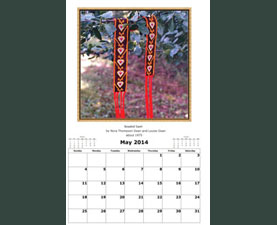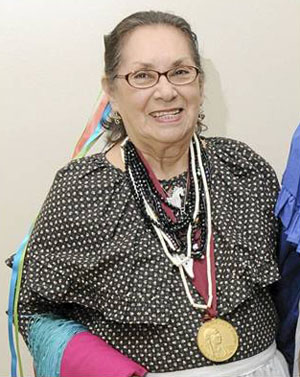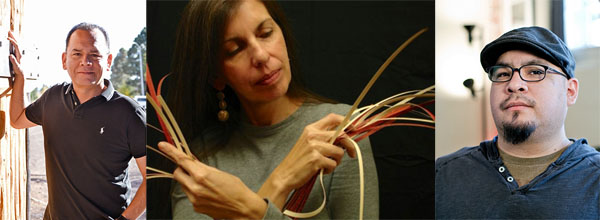Archives
now browsing by author
Special Meeting of the Delaware Trust Board, Dec 16

There will be a special meeting of the Delaware Trust Board on Monday, December 16, 2013 at 1:30 PM in the Delaware Community Center, Bartlesville.
AGENDA
Prayer
Roll Call
I. Approve 2014 Budget with changes approved in New Trust Document
Adjourn
Get Your 2014 Delaware Tribe Calendar

The new 2014 Delaware Artwork Calendar is now available. Compiled by Jim Rementer.
Click on the link below to download the file. It can be printed on any size paper; for a wall calendar it is best to use legal-size paper.
Veterans Assistance Twice Monthly

The Disabled American Veterans (DAV), Washington County Chapter 65 will be at the Community Center reception area on the first and third Monday of every month to assist veterans and their spouses with filing for their VA benefits. There will be someone available from 9:00 am to 12:00 noon, and drop-ins are welcome.
Contact information for Disabled American Veterans:
P.O. Box 491, Dewey, OK 74029
Phone (918) 534-3988
Fax: (918) 534-3909
Library to Honor Bacone College Art Professor


Library to honor Bacone College art professor
By JAMES D. WATTS JR. World Scene Writer
Monday, November 25, 2013
Artist and educator Ruthe Blalock Jones, who has influenced several generations of artists through her work at Bacone College, is the 2014 inductee into the Tulsa City-County Library’s American Indian Resource Center’s Circle of Honor.
The induction will take place March 1, 2014, at Hardesty Regional Library’s Connor’s Cove, 8316 E. 93rd St. The event will also mark the start of the library’s month-long American Indian Festival of Words, honoring the achievements and accomplishments of Native Americans.
Jones called the honor “humbling and gratifying,” in large part because of the previous honorees, which include Charles Chibitty, Wilma Mankiller, Neal McCaleb, Bill Mills and Kirke Kickingbird
“As an artist, I believe we are all interested in honoring and preserving the culture and traditions of our families and tribes,” Jones said. “That is what I have tried to do, with help along the way from my parents, relatives and friends, teachers, collectors and others.”
Jones, who is of Shawnee-Delaware-Peoria descent, was born in Claremore, and began studying art with Charles Banks Wilson at age 10. Three years later, one of her works earned an Honorable Mention in the Philbrook Indian Annual, which at the time was one of the nation’s most prestigious art events for American Indian artists.
She attended Bacone College and earned a bachelor’s degree in fine arts from the University of Tulsa in 1972. In 2011, she was appointed Commissioner of the Indian Arts and Crafts Board by Department of the Interior Secretary Kenneth Salazar. She is director emeritus and associate professor of Art at Bacone College.
Her work — paintings, drawings and various styles of printmaking — focuses on traditional American Indian ceremonial and social events.
Jones’ paintings have been shown in Japan and Uganda as well as throughout the United States, and her work is part of the permanent collections of such institutions as the Heard Museum, the Museum of the American Indian and the National Museum of Natural History.
The Circle of Honor ceremony recognizes an American Indian for his or her achievements by acknowledging the inductee’s contributions that have enriched others’ lives and by celebrating the inductee’s action in the face of adversity, commitment to the preservation of American Indian culture and legacy for future generations.
It is sponsored by the Maxine and Jack Zarrow Family Foundation, Cherokee Builders Inc., American Indian Resource Center and the Tulsa Library Trust. The award consists of a $5,000 honorarium and a medallion featuring the American Indian Resource Center’s turtle logo.
For more information, call 918-549-7323, or visit tulsalibrary.org/airc
From Tulsa World, November 25, 2013.
Meeting with Cherokee Nation

council meeting with Cherokee Nation Secretary of State Chuck Hoskins Jr.
Oklahoma Artists Honored

Oklahoma Artists Honored with Native Arts and Cultures Foundation Fellowships
VANCOUVER, Wash., (Nov. 7, 2013) – From a national call for entries to American Indian, Alaska Native and Native Hawaiian artists, the Native Arts and Cultures Foundation (NACF) has awarded 2014 NACF Artist Fellowships to three Oklahoma artists.
Writer Eddie Chuculate (Muscogee Creek/Cherokee) of Muskogee, Okla. received a 2014 NACF Literature Fellowship. Renowned basket-weaver Shan Goshorn (Eastern Band Cherokee) of Tulsa, Okla. is a 2014 NACF Traditional Arts Fellow and poet Santee Frazier (Cherokee Nation of Oklahoma) of Syracuse, N.Y. received a fellowship in literature.

Left to right: Eddie Chuculate (Muscogee Creek/Cherokee), Shan Goshorn (Eastern Band Cherokee), and Santee Frazier (Cherokee Nation of Oklahoma)
The three talented artists are among 16 American Indian, Alaska Native and Native Hawaiian artists selected by the foundation to carry this honor in 2014. Each year, the Native-led arts foundation awards fellowships to recognize exceptional Native artists who have made a significant impact in the fields of dance, film, literature, music, traditional and visual arts. Chuculate, Goshorn and Frazier are the first Oklahoma artists to be awarded NACF Artist Fellowships.
For 2014, the foundation awarded $220,000 to support individual artists through NACF Artist Fellowships ranging from $10,000 to $20,000 per artist. “It is our honor to present a dynamic new cohort of NACF Artist Fellows for 2014,” said NACF Program Director Reuben Roqueñi (Yaqui/Mexican). “Native artists are taking leadership in addressing critical issues across the country and act as catalysts for change in our communities. The fellowships support these artists as they delve deeper into their practices and cultivate their artistic voices to transport and inspire us. Join us in celebrating their adventurous and creative spirits.”
2014 NACF Artist Fellows:
- Keola Beamer (Native Hawaiian), Lahaina, Hawaii, Music Fellowship
- Raven Chacon (Navajo), Albuquerque, N.M., Music Fellowship
- Eddie Chuculate (Muscogee Creek/Cherokee), Muskogee, Okla., Literature Fellowship
- Kaili Chun (Native Hawaiian), Honolulu, Visual Arts Fellowship
- Santee Frazier (Cherokee Nation of Oklahoma), Syracuse, N.Y., Literature Fellowship
- Jeremy Frey (Passamaquoddy), Indian Island, Maine, Traditional Arts Fellowship
- Shan Goshorn (Eastern Band of Cherokee), Tulsa, Okla., Traditional Arts Fellowship
- Melissa Henry (Navajo), Rehoboth, N.M., Film Fellowship
- Micah Kamohoali’i (Native Hawaiian), Kamuela, Hawaii, Dance Fellowship
- Billy Luther (Navajo/Hopi/Laguna), Los Angeles, Film Fellowship
- Patrick Makuakāne (Native Hawaiian), San Francisco, Dance Fellowship
- Nora Naranjo-Morse (Tewa-Santa Clara Pueblo), Espanola, N.M., Visual Arts Fellowship
- Da-ka-xeen Mehner (Tlingit/N’ishga), Fairbanks, Alaska, Visual Arts Fellowship
- Israel Shotridge (Tlingit), Vashon, Wash., Traditional Arts Fellowship
- Brooke Swaney (Blackfeet/Salish), Polson, Mont., Film Fellowship
- David Treuer (Ojibwe), Claremont, Calif., Literature Fellowship
Since 2010, the foundation has supported 85 Native artists and organizations in 22 states, awarding $1,602,000 in assistance, including an award to the Association of Tribal Archives, Libraries and Museums of Oklahoma City. The generosity of arts patrons, the Ford Foundation and Native Nations allows the Native Arts and Cultures Foundation to support the vibrant arts and cultures of American Indian, Alaska Native and Native Hawaiian peoples. To read more about these three Oklahoma artists and all the talented 2014 NACF Artist Fellows, visit: www.nativeartsandcultures.org.














 D5 Creation
D5 Creation